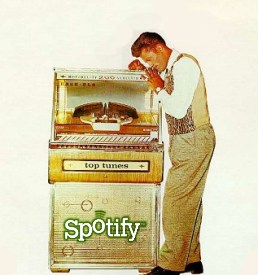The distributive potential of the internet has done its part in disrupting the music industry, most visibly via iTunes. But iTunes was always a sort of simulacrum of a record store. Its icon was even a CD. They were providing, like Amazon, a digital abstraction of a physical store.
Where would we be if computers were just digital abstractions of desks full of paper? They were, of course, for a short time, but since then the potential of the home PC has pushed it further and further from the simple desk analogy. Why shouldn’t it be the same in music?
Many readers of this site are already happily signing up for the new music-streaming services of the net, but much of the world, including the music industry, is lagging far behind and blaming the new services when monetization doesn’t work how they expect. The streamers have responded: Hey, don’t look at us.
There are two simple misunderstandings, it seems. One is why the labels are getting any sympathy at all. They agreed to a licensing agreement, after all. And a proportionate amount of income is diverted to each label. That seems like a reasonable proposition, and it must have seemed so to the labels, which not only own part of the streaming companies but must have negotiated the terms. Why is it they get to cry about it now? Did they not understand the concept of streaming music?
It’s possible, actually, that the streaming music services are simply priced too low. $10, $15, $20 per month for unlimited music is a great deal. Should a service like this be a great deal, or should it be “fair”? After all, $0.99 per song wasn’t that revolutionary. Albums cost $12-18 and pricing ended up comparable. The fact that you could buy things song by song changed a lot, but as far as pricing went, it wasn’t actually a bargain. The improvement was in convenience.
But the streamers can’t just start jacking up prices. They’ve set a precedent with this $10 level, and the market likes it. Why wouldn’t they? But it doesn’t strike me as price-equivalent to what we’ve been paying, more or less, for years and years. Sure, prices change. But why they change is a complicated question with many moving parts, and I’m not entirely convinced that $10 for unlimited streaming is a price point that can be maintained.
Relevant to this is the second misunderstanding, which is the value of non-unit sales. Comparisons between income from album sales and income from streaming just don’t make sense. In a way, people are paying for nothing, because at the end of the month, if their subscription lapses, they have nothing to show for it. The labels and Spotify have something to show for it, though, and haven’t in fact given anything away. And people pay again and again for the same content. If I listen to a song this month and then again next month, I’ve paid twice, haven’t I? Or have I? The economics and philosophy of providing streams needs to be settled at an open table so everybody knows what they’re talking about, and things like Lady Gaga’s ridiculous allegations of microscopic payouts can be avoided.
But at the same time, it’s hard to deny that smaller bands, whose sales came largely from iTunes and low-overhead small-scale record sales, are going to be left out in the cold. Should they just tour more? Or should they be pushing for a different, more lucrative licensing agreement? Good luck without major-label clout.
The entire cost of producing music, in fact, needs to be reassessed honestly and openly. The basic price of goods has to do with the cost of producing those goods, and we’re using old numbers. How much would bananas cost if you didn’t have to pay for transport? A lot less, I’m guessing. How much less should music cost now that the costs involved in production have gone down enormously, and the costs of manufacturing and distribution have been, theoretically, almost totally eliminated? Again, probably a lot less.
Getting an honest assessment isn’t going to be easy. The RIAA isn’t exactly forthright on these matters, and naturally has an interest in keeping the perceived value of their product high. In the end, progress always ends up being a net opportunity, which is a nice way of saying that losses in ability or value may occur. The improvement caused by the internet has put thousands of retail and factory employees in the music industry out of work. The RIAA isn’t immune to the same action, the contraction of part of its market, and the sooner it acknowledges this and plans for the future, the better.
